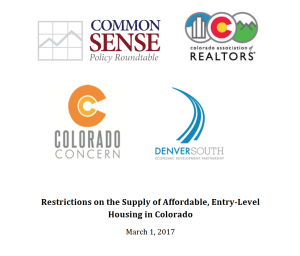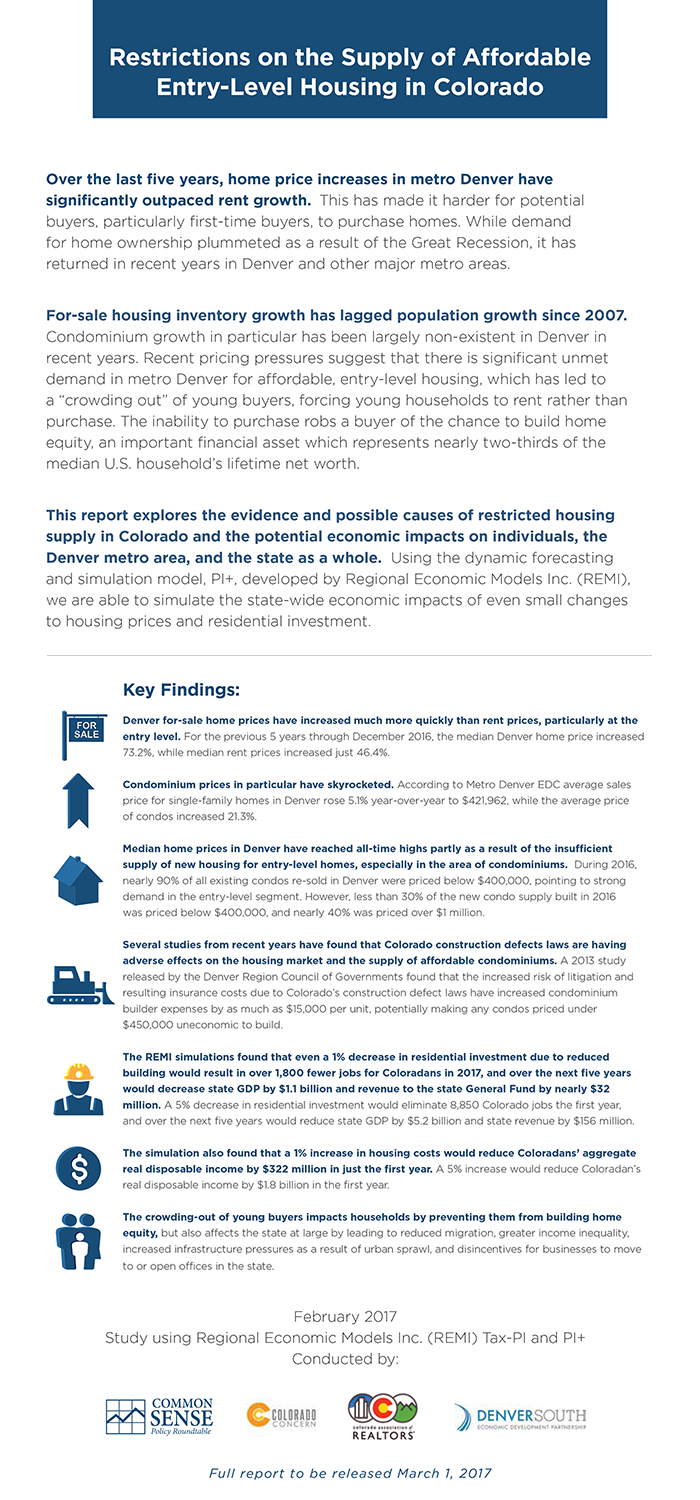
EXECUTIVE SUMMARY
Over the last five years, home price increases in metro Denver have significantly outpaced price increases in the rental market. This has made it harder for potential buyers, particularly first-time buyers, to purchase homes. While demand for home ownership plummeted as a result of the Great Recession, it has returned in recent years in Denver and other major metro areas.
For-sale housing inventory growth has lagged population growth since 2007. Condominium growth in particular has been largely non-existent in Denver in recent years. Recent pricing pressures suggest that there is significant unmet demand in metro Denver for affordable, entry-level housing, which has led to a “crowding out” of young buyers, forcing young households to rent rather than purchase. The inability to purchase robs a buyer of the chance to build home equity, an important financial asset which represents nearly two-thirds of the median U.S. household’s lifetime net worth.
This report explores the evidence and possible causes of restricted housing supply in Colorado and the potential economic impacts on individuals, the Denver metro area, and the state as a whole. Using the dynamic forecasting and simulation model, PI+, developed by Regional Economic Models Inc. (REMI), we are able to simulate the state-wide economic impacts of even small changes to housing prices and residential investment.
Key findings:
- Denver for-sale home prices have increased much more quickly than rent prices, particularly at the entry level. For the previous 5 years through December 2016, the median Denver home price increased 73.2%, while median rent prices increased just 46.4%.
- Condominium prices in particular have skyrocketed. According to Metro Denver EDC average sales price for single-family homes in Denver rose 5.1% year-over-year to $421,962, while the average price of condos increased 21.3%.
- Median home prices in Denver have reached all-time highs partly as a result of the insufficient supply of new housing for entry-level homes, especially in the area of condominiums. During 2016, nearly 90% of all existing condos re-sold in Denver were priced below $400,000, pointing to strong demand in the entry-level segment. However, less than 30% of the new condos built in 2016 were priced below $400,000, and nearly 40% were priced over $1 million.
- Several studies from recent years have found that Colorado construction defects laws are having adverse effects on the housing market and the supply of affordable condominiums.A 2013 study released by the Denver Region Council of Governments found that the increased risk of litigation and resulting insurance costs due to Colorado’s construction defect laws have increased condominium builder expenses by as much as $15,000 per unit, potentially making any condos priced under $450,000 uneconomic to build.
- The REMI simulations found that even a 1% decrease in residential investment due to reduced building would result in over 1,800 fewer jobs for Coloradans in 2017, and over the next five years would decrease state GDP by $1.1 billion and revenue to the state General Fund by nearly $32 million. A 5% decrease in residential investment would eliminate 8,850 Colorado jobs the first year, and over the next five years would reduce state GDP by $5.2 billion and state revenue by $156 million.
- The simulation also found that a 1% increase in housing costs would reduce Coloradans’ aggregate real disposable income by $322 million in just the first year. A 5% increase would reduce Coloradan’s real disposable income by $1.8 billion in the first year.
- The crowding-out of young buyers impacts households by preventing them from building home equity, but also affects the state at large by leading to reduced migration, greater income inequality, increased infrastructure pressures as a result of urban sprawl, and disincentives for businesses to move to or open offices in the state.
OVERVIEW
Over the last five years, home price increases in Denver have significantly outpaced price increases in the rental market, making it harder for potential buyers to purchase homes, particularly in the entry-level segment. While demand for for-sale housing plummeted as a result of the Great Recession, it has returned in recent years in Denver and other major metro areas. At the same time, for-sale housing inventory growth has lagged population growth since 2007, most notably in the U.S. West Census Region, which includes the Denver metro area. Condominium growth in particular has been largely non-existent in Denver in recent years, which has contributed to the restricted supply. Recent pricing pressures suggest that there is significant unmet demand in Denver for affordable, entry-level housing.
This paper describes why there is a strong case that prices in Denver are being driven higher due to restricted supply, particularly in the condominium market, and how this has led to a “crowding out” of young buyers, forcing young households to rent rather than purchase. The inability to purchase robs a buyer of the chance to build home equity, an important financial asset which represents nearly two-thirds of the median U.S. household’s net worth. This report also explores how current construction defect legislation is likely contributing to restricted condominium supply in Denver and, using Regional Economic Models Inc.’s PI+ and Tax-PI dynamic forecasting models, explores the broader economic impacts of lower residential investment and higher housing costs...
Download the complete study in pdf format >>
Pdf file (2.2MB)
 Download the infographic in pdf format >>
Download the infographic in pdf format >>
Pdf file (93KB)